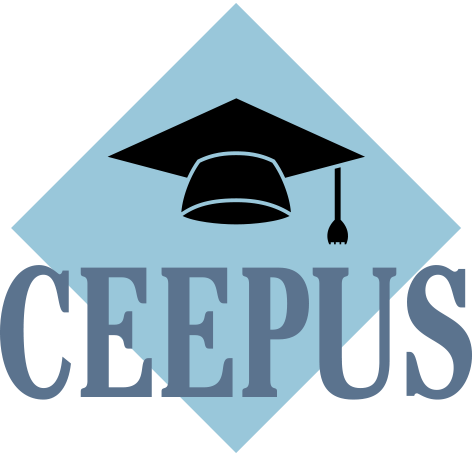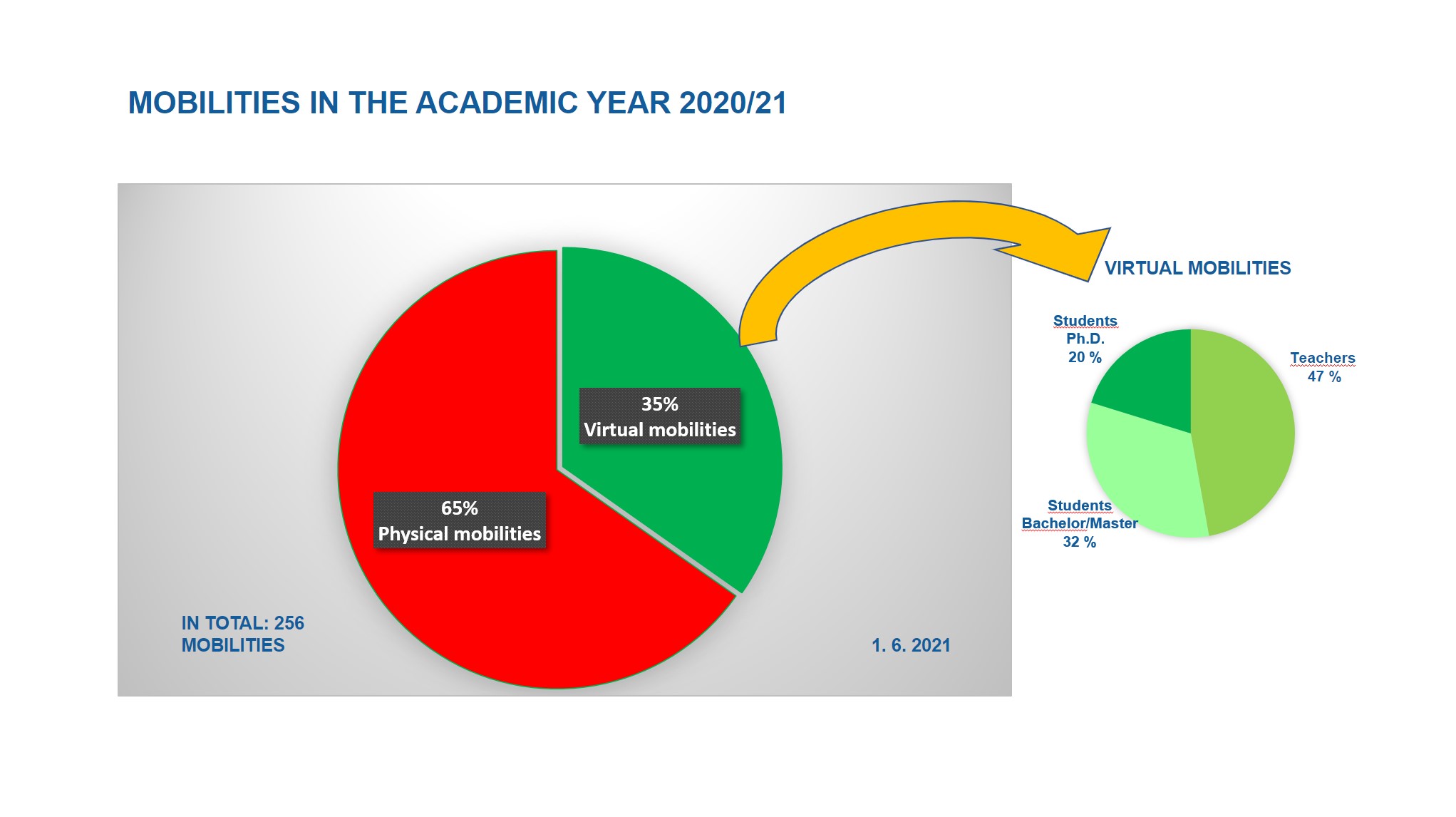
Faced with the challenges posed by the COVID-19 pandemic the countries involved in the Central European Exchange Program for University Studies tried to give an adequate response to the drastically decreasing number of implemented mobilities.
Virtual Exchange in the CEEPUS Programme - The Experience of some Member Countries
It is important to note that CEEPUS is a flexible program that has many aspects of national competence (e.g. CEEPUS grants are paid out by the host country according to the respective national regulations) with some common rules.
First measures were already taken at the beginning of the pandemic by adopting grant regulations to allow already started exchange stays to be continued online in the host country or as hybrid stays after returning home. Because of the narrow definition of grant stays in the CEEPUS Agreement, those adaptations were only possible to a limited extent. The disbursement of full virtual grants without the obligation to travel into the host country was not intended in the effective CEEPUS Work Programme.
Therefore, in December 2020, the Senior Officials – representing the responsible ministries – of the CEEPUS member states unanimously voted to enable the temporary implementation of CEEPUS grants for virtual exchange during the COVID-19 crisis in the academic year 2020/2021 in those member countries which are willing to introduce such measures according to their respective national regulations. Based on this decision more and more member countries started to offer virtual and/or hybrid exchange with a reduced amount of the usual scholarship rates, meanwhile provided a testing ground for this new initiative.
 The Joint Committee of Ministers – the highest decision-making body of the programme – confirmed this new initiative in June 2021, what is more adopted the new Work Programme for 2021-2023 with the extension of virtual and/or hybrid exchange in those member countries which are willing to introduce such measures according to their respective national regulations.
The Joint Committee of Ministers – the highest decision-making body of the programme – confirmed this new initiative in June 2021, what is more adopted the new Work Programme for 2021-2023 with the extension of virtual and/or hybrid exchange in those member countries which are willing to introduce such measures according to their respective national regulations.
As the current programme phase of CEEPUS will end in 2025, the CEEPUS Senior Officials and the Central CEEPUS Office along with the National CEEPUS Offices started to collect ideas and key aspects for a post-2025 CEEPUS strategic framework in the past year. The Ministers approved the strategic framework in June 2021, on the basis of which the new CEEPUS IV Agreement can be worked out. This will very likely introduce virtual and hybrid exchange as a concept for the future, complementing the traditional way of exchange, which will remain the priority.
Read more about the measures and experience regarding virtual exchange in the CEEPUS Programme in Croatia, the Czech Republic, Hungary, Poland and Serbia.
Croatia
Croatia introduced virtual and blended mobility at the very beginning of the academic year 2020/2021. This decision was considered prior to the start of the academic year, having in mind that the new academic year and autumn months could easily bring new lockdown and that Croatian HEIs would once again switch to online lectures. Many Croatian institutions had previous positive experience with online teaching and learning from the summer term of 2019/2020, when many of incoming students had to finish their mobility online and a few teachers also held their lectures online. Another important reason to support virtual mobility lies in the structure of the CEEPUS itself: the majority of the exchange in CEEPUS happens within thematic CEEPUS networks, partnerships involving HEIs from different CEEPUS countries. The cooperation between network partners, based on the complementarity of their study programs, already faced temporarily setback during the summer term of the previous academic year and networks could not fulfil goals planned in their annual application. Some of the network partners rely on each other in conducting the regular courses. During the time when the travel was restricted and the education sector was investing significant effort and funds in switching to the online form in order to continue sharing knowledge ‘virtually’, it was somehow logical to offer the same option to the CEEPUS network partners and support them to continue their cooperation virtually. The scholarship rates for the incoming virtual mobility at Croatian HEIs were set at 50% of the scholarship rates for the physical mobility. During autumn and winter months many applicants who originally applied for physical mobility have decided to change their mobility into virtual one. Students mostly opted for the combined mobility, which started as virtual from their home countries, with the plan to come to Croatia physically, if the circumstances allowed it. Teacher mobilities and short-term student mobilities (especially short group courses) were the easiest to organize virtually. During the summer term of the academic year 2020/2021 the interest in physical mobility has started to slightly rise and the same trend will probably continue during the upcoming months due to the fact that the COVID-19 epidemic situation is improving in Europe.
By the end of June 2021 little less than 44% of all incoming mobility at Croatian HEIs (106 mobility participants) will complete their mobility through distance teaching and learning from their home countries. Two thirds of virtual mobility participants are teachers while only one third are students of all study levels. (There has been a siginificant decrease in the number of the incoming student mobility compared to the number of incoming teacher mobility during the academic year 2020/2021. The ratio of student and teacher incoming mobility in CEEPUS during pre-pandemic years was usually 50:50.) There is no significant difference in the share of students and/or teachers in overall number of mobilities whether it was virtual or physical mobility. CEEPUS scholarship holders who completed their incoming mobility virtually at Croatian HEIs were offered to fill out a short questionnaire. The respondents rated highly the opportunity to complete mobility virtually, as well as the quality of the actual mobility completed online, saying that the lectures were well organized and conducted. Main advantages are time efficiency, flexibility in planning and the beneficial impact virtual mobility has on the international cooperation. Main disadvantages are technical issues and lack of the personal contacts during and after the lectures (networking). Respondents also commented a lack of the real-life experience of travelling to another country and getting to know a new culture, which has a positive and motivating effect on mobility participants. As an added value, respondents see new mobility formats of international cooperation, e.g. joint lectures or even joint courses for the students of two or more institutions, which would involve larger groups of students in the international experience. Virtual mobility can also strongly motivate some teachers to create new forms of international cooperation within CEEPUS networks.
Croatia will carry on with awarding incoming virtual mobility in CEEPUS during the next academic year. Although the virtual solution probably will not be the first choice of the candidates, it is important to have prepared alternative solution which would allow networks and individuals to continue with exchanging knowledge, even during the difficult times. Not less importantly, the virtual mobility allows international experience to certain groups of people (disabled persons, persons who due to different private reasons cannot travel abroad). Finally, virtual and blended mobility have a strong potential to develop new forms of exchange between larger groups of people, which is yet to be explored.
Contact: Tanja Veljak, Agency for Mobility and EU Programmes, ceepus@mobilnost.hr

Czech Republic
The outbreak of the coronavirus in spring 2020 decreased the number of mobilities to the Czech Republic by more than a half in the summer semester 2019/2020, compared to the previous year. An even worse factor was the uncertainty about the further development of the pandemic, which made it impossible to plan future mobility. As a result, some partners involved in the networks did not realize any mobility during the whole year 2020. Thus, the Czech Ministry of Education decided, on the basis of the recommendations by the Central CEEPUS Office and university demand, to introduce virtual mobility and hybrid mobility in November 2020. Both new types were offered to students and teachers for short-term and long-term stays, excursions, summer schools and on-line teaching stays.

Teachers and students were also allowed to request a change in the type of mobility they were to undertake (physical – hybrid – virtual). These requests were very frequent. It was also offered to teachers to spread the hours originally intended to be taught, for example, in one month to the entire semester. However, it turned out later that teachers were not really interested in the above option and so, the length of their virtual mobility remained the same as planned for their physical mobility. The scholarship amount for virtual mobility was set at 40 % of the rate for physical mobility for the applicant and 10% for the host university to cover the bank fees. The amount of the scholarship for hybrid mobility was set at 60 % of the rate for physical mobility.
At the outset, the interest in these new types of mobility was small, but persistent. Since the very beginning, there was only a marginal interest in hybrid mobility. Although several of these were approved, the applicants still asked for their ‘conversion’ into the virtual type, later on. Perhaps a little surprisingly, no hybrid mobility has taken place in the programme so far, only virtual and physical ones. Thus, about 35 % of all the incoming mobilities during the year 2020/21 were realized as virtual and 65 % as physical mobilities. Despite the overall satisfaction with virtual mobility among students and teachers, a considerable number of applicants would still prefer physical mobility.
"I am quite satisfied with distance teaching. The previous year has been a challenge, but I'm glad I had a chance to improve myself and adopt some new skills.“ "Distance teaching should always be an option, because there will always be participants who prefer this kind of teaching or are simply not able to participate on-site.“ |
Contact: Jan Trnka, Czech National Agency for International Education and Research, ceepus@dzs.cz
Hungary
In all higher education credit mobility programmes of national competence (Bilateral State Scholarships, CEEPUS and Campus Mundi) Hungary introduced virtual and blended/hybrid exchange for the summer term 2020/2021 and autumn term 2021/2022 as a temporary measure in response to the pandemic. Physical mobility has been an absolute priority but during the times of travel restrictions at least some of the planned mobilities could be implemented in virtual form.
In Hungary, the CEEPUS exchange period of incoming mobilities can be rescheduled within an academic year as a usual procedure, if necessary to implement the mobility. In addition, now, both students and teachers can change the form of mobility from physical to virtual or vice versa, based on the confirmation of the host institution. In the case of virtual exchange, scholarship holders are entitled for a reduced amount of the physical grant. Participants are encouraged to make use of the hybrid exchange and realize the mobility at least partly physically, if feasible. Under the programme, Hungary offers summer schools and coordinators’ meetings in virtual form, too.
In the summer term of 2020/2021 there has not been too much interest towards these new opportunities, only some ten mobilities have been realized in virtual form and only a very few in hybrid form. Most of the applicants implementing virtual exchange have been teachers and short term students (for 1-2 months). However, in 2019/2020 there were two summer schools organized virtually with great success and very good experience, and also in 2020/2021 there are two summer schools to be held online (see some testimonials below).
University staff involved in CEEPUS in Hungary emphasised that during the lockdown physical mobility was not possible at most of the universities, so virtual remained the only option. They also highlighted that as the universities were fully online, institutions could imbed virtual exchange easily, which was supported by the university/faculty leadership. According to international officers this is a good complementary option for motivated applicants but currently they do not think that virtual will be as popular in the future as physical mobility.
"By participating in this online summer course I found the perfect balance between academic learning, social engagement and cultural insights not only about Pécs but about Hungary in general. It was such a great online experience that it outweighted all of my expectations.“ "This is the most practical online education I have ever taken in my life. Thanks to the interactive approach, a sense of immersion is created in a situation where the professor, together with students, explores and analyzes each individual moment of a particular topic. After completing the course, I gained basic knowledge and practical skills in analyzing the vision and mission from Europe. I would definitely recommend the online summer course to fellow students!“ |
Contact: Gábor Kamocsa, Tempus Public Foundation, ceepus@tpf.hu

Poland
Poland implemented virtual scholarships as part of the CEEPUS internships in the summer semester of the 2020/21 academic year. The possibility of awarding virtual scholarships has proved successful as one of the forms of maintaining academic ties and a tool to counteract the negative aspects of the pandemic. The virtual scholarship option will remain with us in the future as a tool enabling flexible adaptation to the needs of CEEPUS fellows and cooperating partners. It will also be another manifestation of flexibility in the approach of the CEEPUS Agreement to the natural needs and possibilities of the member states. We are guided by the principle ‘not everyone has to’, but ‘everyone can’.
In the period from February 2021 until today (June 2021), the Polish CEEPUS Office has already awarded 146 virtual scholarships, compared to the planned 95 scholarships with a physical stay in Poland. It can therefore be said that this alternative tool is of great interest in these difficult times for cross-border academic mobility. Virtual scholarships are awarded to foreigners in the amount of 50% of physical mobility. They can be awarded to students, PhD students and teaching staff. The procedures and rules are the same as for all CEEPUS mobilities, only additional confirmation of the virtual mobility plan by the host unit is required.
This success largely depends on the involvement of a group of CEEPUS academic partners planning and implementing internships at universities in Poland. Examples are summer schools and intensive courses that have already been planned and implemented in virtual form. However, everyone emphasizes that the virtual internship option will not replace physical academic mobility, but will only become a positive solution in Poland for difficult times.
In conclusion, two Polish academics describe their activities in a virtual school.
The intensive course Consumer Behavior in Central Europe was organised by the SGH Warsaw School of Economics on 12-17 April 2021. - dr hab. Lidia Danik, prof. SGHThe course was a part of the 5th edition of the Central Europe Connect – A Joint Certificate Program launched in 2018 within a collaboration of three business schools SGH Warsaw School of Economics, Vienna University of Economics and Business (WU) and University of Economics in Bratislava (EUBA) belonging to the CEEPUS Amadeus network. Within the Program bachelor students from all three universities participated in three one-week blocked courses, each organized at one of the locations WU (Vienna), EUBA (Bratislava) and SGH (Warsaw). The interactive, practice-oriented courses aimed at sensitising students to the Central European economic region and preparing them for taking management positions in companies operating in Central Europe. Company visits, guest speakers and social events enabled students to build up a personal and professional network in the region. Under previous editions of the Program, students spent a week at each of the partner universities, but the COVID pandemic has prompted a shift to an online mode. Surveys completed by students after the course showed that they found it very interesting, useful and well organised and that it allowed them to make international contacts despite the online format. They have also enjoyed the company visits and virtual tours. However, they were missing more contact with their colleagues, which could be possible only in the case of physical mobility. |
Summer School ‘Internet of Things – Challenges, Applications, Trends’ organized by Kielce University of Technology, held on 17-28 May 2021. - dr inż. Katarzyna Dorota CioskNumber of registered participants 58 (41 mobilities) from 7 countries took part in the school. All participants expressed their satisfaction with the possibility of participating in the summer school in this form and hope that this form of activity will also be possible in the following years. The advantages of the virtual organization of the CEEPUS school include:
The disadvantage of the virtual school include:
|
Summing up, they evaluate the possibility of organizing an online summer school very positively and recommend it as one of the forms of future mobilities.
Contact: Michal Skowronski, Polish National Agency for Academic Exchange, ceepus@nawa.gov.pl
Serbia
Having in mind that due to the COVID-19 outbreak in 2019/2020 only 43% of the awarded mobilities for the stated academic year have been carried out, the main challenge in the framework of CEEPUS program for the year 2020/2021 was to introduce a solution that will, at least at a certain level, enable continuity in the academic exchange in the following period.
As a result, in January 2021 an option for blended mobility was introduced for the CEEPUS candidates that were coming to the Republic of Serbia. Blended mobilities are comprised of the obligatory physical and virtual part of the mobility and preconditions regarding the duration of every part are defined (exclusively virtual exchanges were not supported in the Republic of Serbia). The applicants could choose between traditional and blended mobility, and the option to change the already awarded mobility type was also enabled. The most important request refers to the agreement of the host HEI that the aim of the academic exchange can be obtained through the newly introduced mobility option, so the candidates and host HEI must agree to the new mobility form. In the case of hybrid mobility in the Republic of Serbia, scholarships are calculated based on the duration of the physical part (calculated under already established rates) and the duration of the virtual part (rates for this part are designed at approximately 50% of the physical rates).
The blended mobility is offered for both teacher and student mobilities that last longer than half of the scholarship month, and although the general interest in the traditional mobility remains, several teacher and one student mobility are currently being carried out in the blended form. The final effects of this option will be analyzed upon conclusion of the mobilities.
Contact: Danica Šcepanovic, Foundation Tempus, ceepus@tempus.ac.rs
Utolsó módosítás: 2021.09.03.













